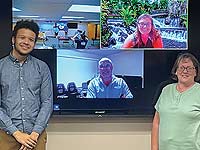 Utah State University Moab has launched a new certificate program. Students can now earn the community healthcare worker certificate, which is awarded upon completion of the 18-module course. Graduates of the course are granted a certification from the Utah Department of Health Environment, Policy & Improved Clinic Care (EPICC) program. Utah State University Moab has launched a new certificate program. Students can now earn the community healthcare worker certificate, which is awarded upon completion of the 18-module course. Graduates of the course are granted a certification from the Utah Department of Health Environment, Policy & Improved Clinic Care (EPICC) program.
The first cohort of the program already started and was be completed at the end of June. The program is designed to be completed in 9-12 weeks.
“The CHW cohort is a fantastic opportunity for students and certified graduates to be recognized and participate in a formal and intensive training to support their existing experiences assisting their communities,” said CHW program facilitator Maria Velasco Burgos. “Students also network and connect with different organizations that can help them build their projects depending on their population focus or interest. Facilitators have solid and individualized relationships with students to ensure they assist them in getting the most from the program.”
 |
| USU Moab students Kolby Williams and Gail Wakefield and other members of the first Community Healthcare Workers certificate cohort. |
The Community Health Worker Core Skills Certification provides training on the implementation of innovative prevention strategies outside of the clinical setting and interventions that will reach whole populations and not only those with access to the traditional healthcare system.
“Rural communities have a lot of public health barriers and are affected by many disparities’ issues,” Velasco Burgos said. “This program is a great way to help the Moab community to address its challenging health problems. Students are part of different local organizations and are being able to be work with specific populations already.”
The program is self-paced, with class members meeting twice a week to receive help with coursework and to walk through the modules. The students complete the program with an apprentice style practicum in the field, performing community health work in various locations in Moab. Through the program, participants will complete core competency training in advocacy, outreach, capacity building, individual and community assessment, care coordination and system navigation, interpersonal skills and relationship building, popular education and facilitation, professional conduct, communication, and knowledge.
The certification program was created to address a growing need for community health workers in the rural parts of the state of Utah. These workers would fill gaps resulting from primary and mental health care having limited availability and unable to meet the demand in a geographically distanced and economically evolving rural areas, such as Moab. This program is financed through two grants, the Governor’s Office of Economic Development Learn & Work grant and the Utah State Board of Education Perkins V “Special Projects Grant.”
Students interested in the program should reach out to Maria Velasco Burgos (maria.velascoburgos@usu.edu) in order to receive an application. Applications are sent to the Utah Department of Health EPICC Program and the Utah Community Health Worker Association (UCA). UCA prioritizes applications based on level of community involvement, years working as a community health worker, cultural abilities to reach underserved populations, motivation and purpose, and other factors.
Those selected for the cohort are accepted to USU Moab and will receive the training free of charge. Those not selected will be eligible to be selected in future cohorts. Applications for the next cohort, which will begin in July, are currently being accepted.
USU Moab is home to over 90 degrees and certificates options, including nursing, health professions, social work, and technical careers. For more information about USU Moab, please visit moab.usu.edu.
|